I’ll be honest, I’ve never been on a writing retreat. So as the days got closer to October, my excitement grew. What all is involved? What is expected of me?
Like most gals (I think), I thought about accessories. What do I wear? Which made me think about my suitcase. I hate using the same old black blah suitcase so I went shopping. I’ll also be going to a conference in November so I’ve been thinking about this. I went to JaCque Penney and found exactly what I was looking for. I love this color of blue.

I also got so excited that I asked a talented friend to make something to “mark” the occasion. She made AMW book markers and magnets. Aren’t they cute?
(I think we should have more of these for prizes at future AMW events)
Friday finally came around, time to get to the cabin! I gathered my notes, computer, and supplies.

I got my directions and I was on my way! I arrived in no time at all and was the first to get there. I hunted around for the key, found it and let myself in. It was a gorgeous day so I opened all the windows. Let the magic begin! 
While I waited for the others to arrive I unpacked. I heard a vehicle approaching. Yay! They’re here! Nope, a truck pulling a large BBQ cooker was arriving at the property next door. About ten minutes later I heard another engine. Yay! Nope, another truck pulling a large cooker, followed by a few more trucks.
By the time my cohorts had arrived, five more cookers had passed by. They were planning on some serious BBQ next door.Turns out there was a cook-off planned for the same weekend.
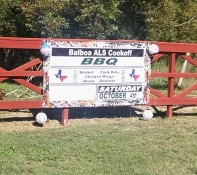
That’s okay because nothing was going to stop us!
We visited, relaxed, and had a nice time that first night.
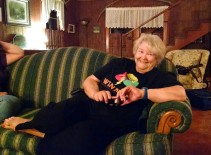

The next morning we awoke with a sense of business. Time to write! At first this was all I could think about, a keyboard staring back at me.
I’m so glad I have an outline to keep me on track. Once I got started, I was in the groove and made some good progress. Throughout the day, we wrote in writing sprints. They were usually about 30 minutes long with breaks in between. During the breaks I’d go outside and enjoy the cool weather and listen to the music from the cook off next door.  (We never did bet brave enough to see if they needed more judges.)
(We never did bet brave enough to see if they needed more judges.)
By the time we left on Sunday, all three of us had made quite a bit of progress on our projects. Mine was definitely more than if I had stayed at home. It was nice to share a creative space and have that extra discipline.
I declare the 2014 retreat a success!
Have you ever been on a writing retreat? Please share your ideas and experiences.
Posted in Writing by VP with .
I know I’ve posted this on my FB page and on Twitter but I wanted to put something here on my website. I’m going to have something published! I’m a member of Austin Mystery Writers and we decided to put together on anthology of stories, of course about murder! The anthology will be called Murder on Wheels and it’s expected to come out sometime in Spring of 2015. Look for my creepy story, “Rota Fortunae”! Lots of good stories, some funny and some intense.
Posted in Writing by VP with .
I recently interviewed Tim Bryant for the Austin Mystery Writers website. The following is that interview. Enjoy!
I recently met author Tim Bryant at Book People’s Lonestar Mystery Discussion. He’s such an interesting person, I wanted to know more about him, his creative process, and his path to writing. Thanks for letting me interview you, Tim! 
AMW – When did you know that you wanted to be a writer?
TB – I’m not entirely sure I ever wanted to be a writer. I just was one. My grandmother probably knew I was a writer when I was ten years old. It took me at least thirty more years to realize she was onto something. I dedicated my first novel to her. I was happy that she was able to see it before she died.
AMW – What was the first creation of yours that got published?
TB – Well, I had had music published because I came to fiction writing after many years as a musician. The first piece of fiction I got published was my first Dutch Curridge short story. It’s called “Bob Wills Is Still The King,” and it was published in REAL Regarding Arts & Letters Literary Magazine. I had written several other Dutch short stories and a lot of non-Dutch stories too, of course, but that was the one that pretty much started everything.
AMW – How long did it take for you to write your first novel?
TB – The first novel was DUTCH CURRIDGE. It took close to a year from start to finish, although the real meat of the writing probably took four months. My original idea with it was that I would take the collection of Dutch Curridge short stories— I think there were six or seven of them at that point— and weave them together into novel form. It was a fine idea in theory, it just didn’t work. I finally ended up setting all of those stories aside and writing the novel from scratch. Some of the earlier material worked its way into it, but only here and there. The story about the migrating squirrels and that parts about Dutch’s marriage and divorce, to name two examples. The bulk of the story was new material and was much better for it.
AMW – Did anyone help you? Did you belong to a critique group?
TB – Unfortunately, I didn’t have any kind of group during the writing of the first novel. I wish I had. That did come along almost immediately after, and a couple of the people are still with me today. My friend Brett Gaffney has been a huge help with workshopping and even helped co-write the book THOSE WHO KNOW US BEST DON’T KNOW US AT ALL. It’s a book of free verse, but it also has a dark, mysterious edge to it and actually shares a character with the Dutch books. Brett’s my first go-to with things, and I do think writers need that. My good friend Jen Moody edited “Doll’s Eyes,” which was part of the Subterranean Press anthology IMPOSSIBLE MONSTERS. She did such an amazing job on that, I asked her to edit the newest Dutch novel, SPIRIT TRAP. She’s top shelf when it comes to editing, and she’s a great fiction writer too. They’re both invaluable secret weapons to have as a writer.
AMW– Do you currently belong to a writing group?
TB – Yes. In addition to Brett and Jen, I have a local writing group that meets regularly. They’re librarians and teachers in addition to being writers, and they’re great motivators, supportive friends, and I owe them a lot as well. I also hang out with Joe Lansdale from time to time, when he’s in town. I’ve certainly learned a lot from Joe. Writing is such a solitary endeavor, I find I really need those connections, just to keep me focused…and sane.
AMW – Your recent book, Spirit Trap, is the third book in the Dutch Curridge series. Tell us a little something about Dutch.

TB – Dutch is a private eye in 1950s Fort Worth who worked with the Tarrant County Sheriff’s Department until he realized he was too bad to be a good cop and too good to be a bad one. He identifies strongly with the down-and-out citizens of Fort Worth. He sees himself as one of them, where maybe the other guys on the force didn’t. Dutch has always been an underdog. He’s fought for everything he has (which isn’t much), and he’s ready to fight for every other underdog he meets up with.
On a personal level, he likes Jack Daniels and Dr Pepper, western swing and jazz music and a young lady who writes for the local newspaper. He has a bad ear, which is a leftover from a childhood illness, and a good friend named Slant Face, who hails from Manchester, England.
AMW – The series is set in Fort Worth in 1955. Why Fort Worth and why 1955?
TB – Having a background in music, I wanted to extend some of that to the Dutch stories, and Fort Worth just has an extremely rich musical history. Especially, in that era of the 1940s and ‘50s. WBAP radio was broadcasting all over this part of the country. Bob Wills and Milton Brown were breaking down musical and racial barriers. Jazz clubs were hot, especially in the African-American neighborhoods. Fort Worth was a wild and colorful place, with Hell’s Half Acre downtown and Jacksboro Highway to the north. Dutch belonged in a place like that. He was right at home.
AMW – I’ve been reading the book and I can honestly say it’s what I call a “total immersion experience”. I can hear the music, the voices, and noises of the time. Did you have to do a lot of research to capture the era?
TB – Yes. I’ve done tons of research, and that research continues. I enjoy it so much, I hardly think of it as being research. I love reading about the history, personal accounts, pouring over maps, watching films and listening to recordings from that era and area. I’ve joked that I probably know more about Fort Worth than most people who live there, but it’s true. I’ve only visited a handful of times, believe it or not, but I’d love to spend more time there.
But yes, I did work to get the full effect of the time and place. The feel and the sounds. Fort Worth is much like a character in the books, so it was essential that I get it right.
AMW– Do you write other kinds of stories besides mysteries?
TB – Absolutely. In fact, I’m not sure I really write standard mysteries at all. The second book in the Dutch series, SOUTHERN SELECT, is probably the most straight-forward mystery I’ve written, and, although it’s quite important in the series, it seems to get overlooked a little. I tend to think of mystery in the larger sense. Not so much cases of missing heirlooms and dead bodies, even if those things do show up from time to time. To me, the best mysteries are the ones that are never solved. They get people thinking and talking. They’re the ones that draw them in, keep them up at night. So I like stories that ask questions more than I like stories that answer them. I think most of my stories ask the questions that intrigue me most.
AMW– You mentioned you’re a musician. What instrument and what kind of music do you play? Is your music available online?
TB – I’ve played music for most of my life too. I’m primarily a piano player, although I can fake a few other things enough to fool a few people. I play totally by ear, by instinct. I’ve been lucky enough to play music all over New Orleans, around Texas, on the same stage and in studios with some of my heroes.
My music is available on iTunes, most places you find music. It’s under either my name or 2Take Tim, which is a nickname I got down in New Orleans, or Ramshackle Day Parade, a cool international band that I put together. That band featured Steve Wickham, who plays with The Waterboys and Tatanka Ohitika— Strong Buffalo— a Dakota-Sioux poet. Almost all of my music is available at TimBryantsUprightPiano.com.
AMW – What are the next projects you’re looking at? Another Curridge book? Something that’s been on the “back burner” you’ve been dying to get to?
TB – SPIRIT TRAP was the last major thing I wrote. Right before that, I wrote a non-Dutch novel called CONSTELLATIONS. A publisher in New York City is looking at that one. I have two other non-Dutch novels that I’m working on. I tend to alternate between the Dutch books and non-Dutch books, so I’ll most likely finish at least one of them before I return to Dutch.
One is indeed that big one that’s been simmering on the back burner. I think it might be time to bring it forward now. It’s set in the Philippines during World War II, and I’ve been researching that one for a good while now. I was going to say it’s one of those mysteries that’s not really a mystery. I think it would be closer to say it’s a non-mystery that really is one. Everything about life is a mystery, right?
I’ll return to Dutch though. He’s a friend too at this point. He always comes back around, and I’m always happy to see him. There should be at least two more Dutch novels. I think I’ll be back to him in 2015.
AMW – Thank you, Tim and good luck with the new book!
Posted in Interview by VP with .
I posted this last week on Austin Mystery Writers
Whether you’re reading Mystery, Romance, Thriller, or Adventure, the ending is almost always predictable. We hope the bad guy will be caught, the couple that’s at odds with each other will come together, the deadly virus won’t kill everyone on Earth, and the hero will complete his quest.
So why do we read these books? I think it’s because of three things.
- We love a good story. I think the human brain is wired for stories. For millennia that’s how we’ve passed down our history, folklore, and myths.

I believe it’s almost like a form of magic or time travel. Our minds are transported to another place. We are immersed in the story and feel for the characters. And if the writing is really good, you get a sense that you know the characters personally. I mean really, how cool is that?
- We like the ritual. It can be comforting to know how the story will end. Everyone loves a hero and likes to root for the underdog. (Of course some heroes are anti-heroes. Not very likeable but they get the job done.)

We like coming of age stories and romance because good prevails and we get to believe in true love. It’s also comforting to know that the bad guy will be caught. It’s something to hold onto in an uncertain world.
3. We like the journey and the tingly excitement of uncertainty. We’re in it for the ride. We like to see how the clues will unfold, how the problems will be solved. We’re often surprised with twists and turns, just like on a roller coaster. “Holy moly! Now what’s going to happen?”  And, of course, what often keeps us on the edge of our seats is knowing that possibly not all of the characters we’ve come to love will make it to the end. That little bit of uncertainty keeps me turning pages!
And, of course, what often keeps us on the edge of our seats is knowing that possibly not all of the characters we’ve come to love will make it to the end. That little bit of uncertainty keeps me turning pages!
So, as with most things in life, it’s the journey, not the destination, that’s important. Hopefully we’ve learned a little something along the way, (maybe a new survival skill!), become reacquainted with an archetype, and been along for a fun ride, twists and turns and all. It’s a magic that keeps us coming back for more.
Posted in Uncategorized by VP with .

Steven F. Freeman’s first book in his Blackwell Files series, Nefarious, starts with a bang, literally. Army Communications Captain and cryptologist, Alton Blackwell, is stationed in Kabul and his leg is severely injured in an explosion. I liked Alton right from the start. He’s intelligent and tough, yet he’s also empathetic and kind. Because of his injury, he’s assigned to a desk job, but he’s still able to use his expertise to foil various Al-Qaeda plots. Freeman takes the reader through some nail-biting scenarios, which of course is fun.
Meanwhile, in America a boy is bitten by a raccoon and has to have rabies shots. This leads his father to want to develop a vaccine that’s more effective and less traumatic. I wondered how in the world Freeman was going to connect the two stories, but he does in an inventive and interesting way.
Blackwell returns stateside, which I think is okay with him because he’s now closer to the lovely Mallory Wilson, whom he had met back in Kabul. He’s asked by an Army friend, who now works for the FBI, to help investigate the biotech firm working on the rabies vaccine. People who work for the biotech firm are dying. Blackwell and friends work to discover why, and begin to put the pieces together that uncover a grand conspiracy. The action intensifies, the body count grows, and it’s questionable as to whether Blackwell will be able to handle the physical challenges because of the limitations of his permanently damaged leg.
I don’t usually read techno thrillers, but this one kept me turning pages. Freeman’s newest book, Havoc, the 4th in his Blackwell series, will be out soon. Keep an eye out for it!
This review was written in exchange for a free copy of the book. Can’t beat that deal!
Posted in Review and tagged Nefarious, Steven F. Freeman, Techno Thriller by VP with .
Today I posted an article on Austin Mystery Writers about a recent visit to Huntsville. I thought I’d post it here too.
I recently took a trip to Huntsville, Texas, and everything I saw at every turn stirred up old memories.
– Right behind the hotel where I stayed was the apartment complex where my cousins had lived. A few blocks away was a second place they lived.
– I passed a street of good friends of many years. They hosted a wedding shower for me.
– I passed the fancy restaurant where my grandmother lived for a while when she was a child. I remember that when she told us, we had no idea!
– I saw the nursing home where my other grandmother spent her last years.
All of this within a short drive just to get a burger! My mother’s family has been in the Huntsville area since the mid 1800’s so we have a lot of stories. A couple of my favorites:
– Sam Houston was a friend of the family. He used to come and visit.
– My great-grandfather was sheriff for a while and lived in the jail.
Neither of my parents grew up there, but my father moved there after my parents got divorced. He was offered a job at Sam Houston State University as a Criminal Justice professor. So I have a personal connection to the place through my mother and my father.
Besides the personal connections, there is something that draws me to the place.  Maybe it’s something about the vines growing in the pines, maybe it’s because I love history and old things, maybe it’s because of my “writer brain”, but when I pass old houses, I imagine children playing and grannies rocking while shelling peas. I love browsing through the old stores. I sometimes look at what they’re selling, though I’m more likely to be looking at the tin ceilings and wondering what the original store was.
Maybe it’s something about the vines growing in the pines, maybe it’s because I love history and old things, maybe it’s because of my “writer brain”, but when I pass old houses, I imagine children playing and grannies rocking while shelling peas. I love browsing through the old stores. I sometimes look at what they’re selling, though I’m more likely to be looking at the tin ceilings and wondering what the original store was.
The history of a place just calls out to me. I look at the red leather seats in the booth at a diner and remember when not everyone was welcome as a customer. I look at the young, happy families and wonder if they hear or feel the negative things that happened. Can they even imagine it? I pass the prison walls and know the prison has been there since 1849. Lots of famous and infamous people have been in those walls.
At the university I think of my great great aunts who attended when it was a Sam Houston Normal School. We’ve had a graduate from there in every generation. My grandmother went to kindergarten at Old Main, which has since burned down.
I think about my father when I sit on the bench outside the CJ building that’s dedicated to him. There’s a plaque with his name on it. He used to sit outside and smoke and talk to students. Inside the building there’s a big picture of him. 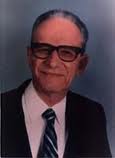 Next to it are plaques with names of students who have received scholarships named after him.
Next to it are plaques with names of students who have received scholarships named after him.
Sometimes when I’m in town, I visit the cemetery. I look up my folks and browse around. Yep, some people like museums, I like cemeteries. When you’re looking at someone’s headstone, you see when they were born and when they died. You can see if they were married or had children buried with them. So many stories untold.
When you’re looking at someone’s headstone, you see when they were born and when they died. You can see if they were married or had children buried with them. So many stories untold.
It’s all a bit overwhelming for me at times. But I guess it’s no surprise that I like to write historical fiction.  For me the place is full of mystery, history, conflicts, love, death and birth. Those piney woods have a lot of secrets.
For me the place is full of mystery, history, conflicts, love, death and birth. Those piney woods have a lot of secrets.
Do you have a place that calls to you?
Posted in Writing and tagged fiction, history, memories, Sam Houston, Writing by VP with .
Today I’d like to share an article written by a friend, Vaughn Roycroft, who is currently working on his historical fantasy trilogy, The Broken Oaks trilogy. Today’s article is about the writer’s process of research and he hits the nail of the head. It spoke to me so much that I wanted to share it with you.
Whether you are researching current police procedures or rituals of ancient Rome, every writer has to do research. Roycroft talks about his process and the pros and cons of getting lost down the rabbit hole.
I’ve included the article here, but if you’d like to share it or see it on his blog, complete with writers’ comments, (And I share a little something in the comments section), go to:
http://vaughnroycroftblog.com/2014/05/02/story-research-letting-the-brain-assist-the-heart/
Enjoy!
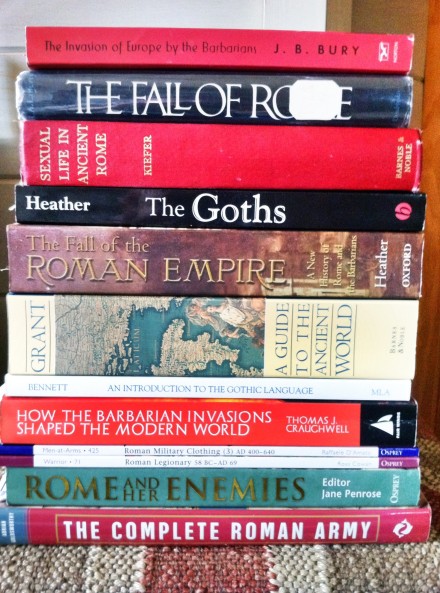 An Intricate Mess:
An Intricate Mess:
“If a cluttered desk is a sign of a cluttered mind, then what are we to think of an empty desk?”~Albert Einstein
I’ve written about my approach to world-building before, in general here, and in regards to names and naming here. But my friend Heather Reed recently undertook a new historical fantasy project, and she asked me specifically about my approach to researching the Broken Oaths trilogy. In looking back at my notes, I’m both excited for her and amazed.
Excited because they remind me of the adventure of the hunt, and the thrill of discovery. But amazed by the wide and disparate variety of sources that I mined for my story elements. In wading through what can only be called a disorganized mess, it’s a wonder that I was able to arrive at anything coherent.
This is one of the reasons I subscribe to the notion of a story muse. I’m the antithesis of organized, which seems contrary to being a good researcher. And yet somehow I was able to pull a story out of my intricate mess.
As an example, I give you my namey-namer cheat-sheet (see photo). It’s a simple 81/2” x 11” sheet of plain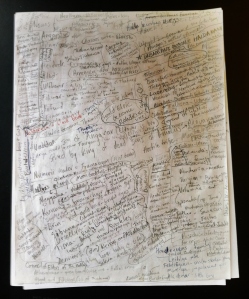 white paper that started out as a short list of possible character names. It’s now covered, front and back, with hundreds of names and obscure references. Please note there is very little means of organization, other than a handful of breakdowns by character group. And yet it continues to serve me well. I’m not sure how I find such a crazy resource helpful, but every time I need to check a name, this is my go-to reference. Honestly, I rarely need it. It’s mostly in issues such as: “Now what’s that secondary character’s grandmother’s name again?” And somehow I know what part of which side to look to find gramma’s name. This from a guy who honestly can’t recall his own phone number. Go figure.
white paper that started out as a short list of possible character names. It’s now covered, front and back, with hundreds of names and obscure references. Please note there is very little means of organization, other than a handful of breakdowns by character group. And yet it continues to serve me well. I’m not sure how I find such a crazy resource helpful, but every time I need to check a name, this is my go-to reference. Honestly, I rarely need it. It’s mostly in issues such as: “Now what’s that secondary character’s grandmother’s name again?” And somehow I know what part of which side to look to find gramma’s name. This from a guy who honestly can’t recall his own phone number. Go figure.
Getting Wet:
“Pearls do not lie on the seashore. He who desires one must dive.” ~Chinese Proverb
We’re in the information age, right? And with so much access to a mighty river of information, the toughest part is going to be finding the tributaries and offshoots that apply to your story. In order to do that, sticking your toe in will not do. You’re going to have to get wet.
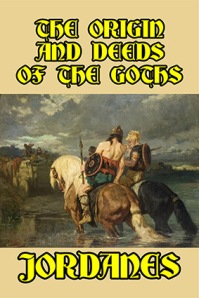 And you never know where the currents will carry you. For example, my quest for original source material about the Goths swiftly revealed a scarcity. Which is why I was so excited to find one of the few existing documents about the Goths by a Goth—Jordanes’ The Origin and Deeds of the Goths. Although I quickly realized Jordanes was writing about previous generations with few specific references and an obvious quantity of bluster, one note caught my attention and held it. He claimed that the Greek myth of the Amazons originated with the Ancient Greeks’ discovery of a group of Goth women whose husbands and sons had left them on the north shore of the Black Sea to raid in Persia and Egypt. I was fascinated, and it led to months of study of the Amazons and related myths and topics. And ultimately, to my creation of the Skolani—an all-female warrior sect that plays a prominent role in all of my work. All from a paragraph in an ancient treatise. There were no kickass warrior women on my radar at the onset, but oh-how-glad I am that I was willing to dive and found my way to them. They are most certainly a pearl.
And you never know where the currents will carry you. For example, my quest for original source material about the Goths swiftly revealed a scarcity. Which is why I was so excited to find one of the few existing documents about the Goths by a Goth—Jordanes’ The Origin and Deeds of the Goths. Although I quickly realized Jordanes was writing about previous generations with few specific references and an obvious quantity of bluster, one note caught my attention and held it. He claimed that the Greek myth of the Amazons originated with the Ancient Greeks’ discovery of a group of Goth women whose husbands and sons had left them on the north shore of the Black Sea to raid in Persia and Egypt. I was fascinated, and it led to months of study of the Amazons and related myths and topics. And ultimately, to my creation of the Skolani—an all-female warrior sect that plays a prominent role in all of my work. All from a paragraph in an ancient treatise. There were no kickass warrior women on my radar at the onset, but oh-how-glad I am that I was willing to dive and found my way to them. They are most certainly a pearl.
There’s a lot to take in, on most any subject. But it’s difficult to pick and choose your sources. I say dive in and let it wash over you. Go with the flow. You might end up somewhere you like.
Panning For Gold:
“The subconscious is a hundred times smarter than we are. We’re just taking dictation.”~Steven Pressfield
In hindsight, I wish I’d worried less about delving for specifics. I wish I’d gone in with only the idea that I was going to educate myself and feed my enthusiasm, knowing the rest would more or less take care of itself. Because that’s what ended up happening.
As another example, in my research of the Goths, I began by broadly perusing subjects pertaining to the Germanic Tribes at the height of the Roman Empire. I studied their social structure and kingship. I went on to study their laws and mores, settlement layouts, agriculture, games and amusements, clothing and jewelry, migration (causes and effects), and their weapons and warfare. What I really wanted was more specific information about how they governed themselves. Sadly, there is little information, and much of it is conflicting.
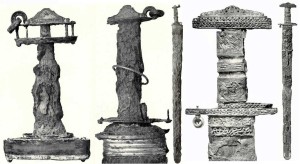 But in the course of my search, as I studied the last topic—weapons and warfare—I now see what became the roots of my solution. There is an entry in my notes from a book called Battle-ax People, by Olivia Vlahos. The note pertains to the expense and significance of swords, and how certain swords became important relics passed from father to son, occasionally symbolizing a legacy of chieftainship. From another book called The Everyday Life of Barbarians: Goths, Franks, and Vandals, by Malcom Todd, I note that some important swords are inscribed with oaths, and occasionally such oaths appeared in the form of rune rings, attached to the hilt. The two notes are only a few sentences each, and were taken several months apart. And yet they clearly led to the Futhark swords of the Gottari ruling clans—the symbolic relics which represent the leadership of my two ruling clans.
But in the course of my search, as I studied the last topic—weapons and warfare—I now see what became the roots of my solution. There is an entry in my notes from a book called Battle-ax People, by Olivia Vlahos. The note pertains to the expense and significance of swords, and how certain swords became important relics passed from father to son, occasionally symbolizing a legacy of chieftainship. From another book called The Everyday Life of Barbarians: Goths, Franks, and Vandals, by Malcom Todd, I note that some important swords are inscribed with oaths, and occasionally such oaths appeared in the form of rune rings, attached to the hilt. The two notes are only a few sentences each, and were taken several months apart. And yet they clearly led to the Futhark swords of the Gottari ruling clans—the symbolic relics which represent the leadership of my two ruling clans.
I don’t see any notation that I’d put the two together—inherited swords symbolic of leadership and rune rings on hilts—at the time. But when it came time to outline, a symbol was needed, and there they were: the Futhark swords. I invented much of the rest of the elements of their governance from other tidbits gleaned over the course of my research, and it all fell into place once I had the Futhark swords. So I’d advise you not to bother looking for bright baubles as you go. Just scoop it in. Your muse (or your subconscious) will sift through for the gems.
Take It From Me (Or Don’t):
It might seem silly, now that you’ve read this far, that a guy who admits he’s a disorganized and somewhat aimless researcher is now going to give you advice on researching. But I am (going to give advice, not silly—or is it both?). Take it or leave it. It’s all in good fun (as any research for fiction should be).
*Find your passion! As I say, this should be fun. If you’re passionate about your subject or era, your research will not only be easy, but a pleasure—something you’ll look forward to doing.
*Give yourself ENOUGH time, but not ENDLESS time. If you’re having fun researching, as you should, you might find a point of diminishing returns. At some point we all have to stop researching and start writing.
*Start online, but zero in with books. Nothing beats the internet for gaining a broader understanding of a topic or era. But you’ll soon realize that if you want any depth and citation, you need to go to books. I buy as many as I can, but for most of us, trips to the library become an indispensable part of any major research project.
*Don’t be afraid to follow the rabbit down the hole. I think I’ve pretty well illustrated this point. If you’re writing about Goths and Romans in the 4th Century AD, don’t be afraid to spend a few months chasing Amazons across Ancient Greece and beyond. Or something along those lines.
Let Your Brain Assist Your Heart:
“I’ve noticed this effect: When writers undertake to write a story, the insights and information they need to write it well tend to arrive unasked for. Those things arrive at the right moments, perfectly timed gifts from the story god.
Or, is it rather that an author’s brain, working on a story, begins to grab available information and synthesize it, which is to say bend, blend and meld it to the purposes of the story?
Is it magic, serendipity or synthesis? Whatever it is, I don’t think it’s accidental. I think authors make it happen. It’s the brain assisting the heart.” ~Donald Maass
Don’s quote above is from a comment he made on a wonderful WU post this week. The post is largely about the mysterious and seemingly random serendipity of the power of the brain, by Maureen Seaberg, the co-author of Struck by Genius. And, as he often does, for me Don took the post to a whole new level.
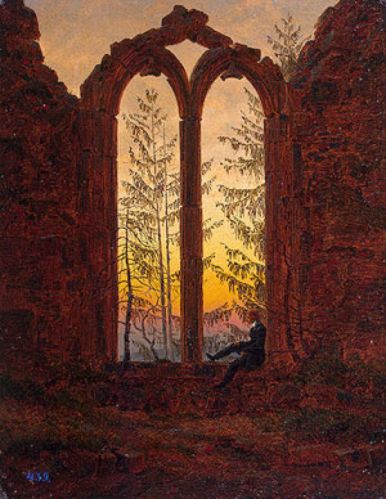 I allotted a year to research when I began my manuscript in earnest. And I ended up with a pile of notebooks even larger than the one pictured above. But once I started writing, I rarely dug through that disorganized mess (perhaps in part because it was disorganized). The insights and information I needed tended to arrive as perfectly timed gifts from the story god. Or did my brain somehow know better than my conscious self which bits to grasp and gather, to then “bend, blend and meld to the purposes of the story”? Either way, I’m glad I somehow found my way to allowing my brain to assist my heart.
I allotted a year to research when I began my manuscript in earnest. And I ended up with a pile of notebooks even larger than the one pictured above. But once I started writing, I rarely dug through that disorganized mess (perhaps in part because it was disorganized). The insights and information I needed tended to arrive as perfectly timed gifts from the story god. Or did my brain somehow know better than my conscious self which bits to grasp and gather, to then “bend, blend and meld to the purposes of the story”? Either way, I’m glad I somehow found my way to allowing my brain to assist my heart.
Moving forward, I’m hoping I can repeat the process, but I’m not too worried. I’ve already stumbled onto streams that have led my subconscious to begin the bending, blending and melding all over again.
Now it’s your turn. Is your research organized? Do your notebooks have color-coded tabs and an index? Do you trust that your brain will know better than your conscious self, and will assist your heart?
Posted in Writing and tagged Donald Maas, research for fiction, Vaughn Roycroft, writer research, Writer Unboxed by VP with .
Over on Austin Mystery Writers I talk about why I write. One of the reasons is a story I wrote in 8th grade called The Spanking Machine. I thought I’d share it with you. This isn’t from the actual paper, but my recollection of it. I guess you could say it’s my second draft of the story. 🙂
The Spanking Machine
My big brother was like most big brothers, he loved to harass and terrorize me. When I was in kindergarten, he told me that when I got to elementary school, I had to be really careful not to get into trouble because the principal had a spanking machine. And this wasn’t just any spanking machine, it was so horrible that she accidentally killed a student while using it.
I was gullible and believed him. As the first day of first grade approached, I was really excited and terrified. The year progressed, I learned to read and write, but didn’t get into trouble because I dreaded going to the office. Other students talked about the machine, so it must be real. Right?
I moved up to second grade the next year and my best friend, Jana, was in first grade. We lived just a few houses down from the school so we walked home together. One day we were feeling particularly adventurous. I don’t recall how the subject came up, but she dared me to lie down in the street. I looked up and down the whole street and there were no cars. Sure, why not? So I went to the middle and laid down for a count to ten. That was that and we played at her house.
The next day at school a voice said over the intercom, “Mrs. Vasquez, please send Valerie to the office.” Everyone looked at me and Mrs. Vasquez was confused. I wasn’t a student to get into trouble. I didn’t want to go, I was scared. “Go on, Valerie. I’m sure everything will be fine.” Was she crazy? I don’t know what I did, but I didn’t want to die!
I walked with dread. What did I do? I entered the office and a secretary sitting at a desk said, “Valerie?”
I nodded.
“Just take a seat and Principal Rockefeller will be with you.”
I sat in a chair in the outer office, waiting for my death. My legs dangled over the edge of the chair; my feet didn’t reach the floor. I felt sick to my stomach, dizzy, and tears streamed down my face. I was too young to die! I’d miss my mom.
I looked around. I wondered which office was hers. I knew it when I saw it. Across the main office there was a door with the word “Principal” on it. It was open about four inches and I could see inside. Against the wall was a large, black machine with lots of dials. Inside my head I groaned. There was the spanking machine!
Mrs. Rockefeller called me into her office and told me to take a seat. “I heard that you did something yesterday that was dangerous.”
I was confused. I didn’t do anything dangerous at school. I tried to read her face for a clue. She just stared at me through her round glasses. I shook my head.
“Oh? A crossing guard saw you lie down in the street after school.”
Immediately I thought, “What I do after school is my business,” but just shook my head.
“Well somebody laid down in the street.”
“That was Jana.”
“Really?” She stood up and walked to the machine.
Sweat popped up onto my upper lip. I looked at the dials, wondering how the machine worked. I wasn’t ready to die. I nodded.
She approached the machine and flipped switches.
My heart was beating so hard it hurt. I thought for sure she’d be able to hear it. More tears ran down my cheeks. I’ll miss my mom and my cat, maybe even my brother. Why didn’t I listen to him? He warned me. I wondered if he’d miss me.
Mrs. Rockefeller leaned forward toward the machine and said, “Mrs. Mitchell, will you please send Jana to the office?”
It was the intercom! There was no such thing as a spanking machine. I was going to live! I was so relieved, until Jana came to the office. She ratted on me and said I was the one that laid down in the street. Great friend, didn’t take the rap for me.
Jana was dismissed. She glanced at me on her way out. She gave me a look that said, “Why did you say I did it?” Hey, I was just trying to survive. Now that I knew I wasn’t going to be beaten to death, the situation was easier to face.
Mrs. Rockefeller faced me again. “So it was you, wasn’t it?”
Time to suck up. I wiped the tears from my face. “Yes, ma’am.”
“Okay, don’t do it again. That was very dangerous.”
I’m not an idiot. I could see all the way down the street that no cars were coming. I also knew it was useless to explain this, so I said, “Yes, ma’am.”
“You may return to class.”
When I walked out of the office the air seemed clearer, the trees more colorful. I had a brush with death and survived! I returned to class and Mrs. Vasquez gave me a questioning look, wondering why I was called in. I just shrugged like a cool pro.
I sat down in my desk and the kid next to me whispered, “Are you okay? Did you get the spanking machine?”
“Naw. We just needed to straighten out some things. She told me I was dangerous. I told her, ‘Yes, ma’am,’ and she let me go. We have an understanding.”
Posted in Writing by VP with .




 (We never did bet brave enough to see if they needed more judges.)
(We never did bet brave enough to see if they needed more judges.)



















